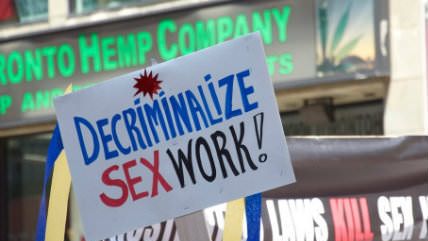No, Rhode Island Didn't 'Accidentally' Decriminalize Prostitution
Decriminalization was the direct result of a lawsuit filed by sex workers in 1976.


In the life of any person who regards herself as principled, there come times when those principles seem to conflict with one's goals; at that point, one is forced to decide whether the principles supersede the goals or the ends justify the means. I was recently faced with such a conflict. There's a study which seems to support the goal of decriminalizing prostitution that is making the rounds in the media and being quoted by everyone, his brother, and his maiden aunt. Unfortunately, that study—which links decriminalization in Rhode Island with falling rates of rape and sexually transmitted infections (STIs)—is deeply flawed in a number of ways, and honesty demands that I not only refrain from promoting it but explain to others why they shouldn't either.
The study in question comes from Scott Cunningham, an economics professor at Baylor University, and Manisha Shah, a public policy professor at the University of California, Los Angeles. It seems to show that in 2004-2009, Rhode Island experienced a steep decline in cases of rape and cases of female gonorrhea. The authors attribute this to prostitution being decriminalized in the state throughout that time period.
The way it's been promoted varies slightly from The Washington Post to Business Insider to Vox to others, but almost always includes phrases like "Rhode Island accidentally legalized prostitution" or (more correctly) "Rhode Island accidentally decriminalized prostitution". This isn't the place for an explanation of the difference between legalization and decriminalization (if you're interested I refer you to my Cato Unbound essay, "Treating Sex Work As Work"). The problem with these statements is more fundamental than that: The "accidental" decriminalization was nothing of the kind.
In July 1976, the first sex-worker rights organization, COYOTE, filed the lawsuit COYOTE v. Roberts in the U.S. District Court for the District of Rhode Island. The provisions of Rhode Island law which COYOTE challenged were those which criminalized the sale or purchase of sex by consenting adults. In May 1980, the Rhode Island legislature settled the case by amending state law so as to render the issues raised in the lawsuit moot.
There was nothing remotely "accidental" about this process. One might speculate about why the legislature chose to settle things rather than allow the case to run its course, but there is no question that it was a calculated and intentional act rather than a mass "whoopsie" by a legislative body. And yet the basic premise of Cunningham's study is that the community somehow managed not to notice the decriminalization of our work for an entire generation, despite the fact that said decriminalization was the direct result of a lawsuit by sex workers! Cunningham chooses the arbitrary date of 2003—the time at which a new crop of politicians realized that they lacked a prostitution prohibition available to their counterparts in other states—as the beginning date of his "natural experiment," despite the fact that there is no earthly reason to believe it should be significant to anyone who was actually buying or selling sex throughout the 23 years prior.
This error speaks to a consistent problem in Cunningham's work: his incredible credulity. As I have previously detailed, Cunningham assumes that statements of age and weight in sex workers' ad copy are truthful and also that each worker has one and only one ad at any given time. In the Rhode Island study, as in others before, he incorrectly presumes that an increase in the number of sex worker advertisements directly correlates to the number of sex workers.
Furthermore, in interviews, Cunningham repeatedly makes the demonstrably-false claim that prior to the advent of the Internet, the great majority of sex work was solicited on the street. He subscribes to the rather odd belief that "before the Internet, clients didn't know where to find the prostitutes and prostitutes did not know where to find the clients"—which would surely come as a shock to the legions of successful sex workers of the pre-Internet era who found their clients via the plethora of other means available, including personal ads in newspapers.
Finally, there's the complicated issue of rape reporting. The relationship between the rape rate and the rape reporting rate is by no means a clear and direct one. And while my gut feeling is that rape would indeed decrease as commercial sex became less marginalized and stigmatized, and some studies do indeed indicate that to be the case, others show no such correlation.
I'm a bit less skeptical of the study's STI findings. I asked Kevin Wilson, a research consultant and graduate student in epidemiology, to analyze the study when we first became aware of it months ago (in pre-publication). "I think it generates some really interesting (and methodologically credible) findings concerning…gonorrhea rates and arrest rates in the state," writes Wilson. And while that may be true, I feel that those findings' inclusion in a study with so many other credibility issues contaminates them to the point of uselessness.
I'm glad to see Americans in general, and journalists in particular, looking for reasons to support the decriminalization of sex work, and I'm heartened by the eagerness with which everyone spread the word about this study. If it had been a good one from a researcher with a solid reputation for dependability, this would be a very different article.
But in our enthusiasm to support the causes of personal liberty and removing state violence from the voluntary activities of consenting adults, we cannot make the mistake of embracing shaky "facts" and shady methods as the prohibitionists do. There's some good sex work research available, and I hope for a lot more in the near future; perhaps someday soon a more trustworthy researcher will do another study which upholds Cunningham's conclusions. But until then, wanting the conclusions of a poor study to be true is insufficient grounds for celebrating them as though they were.


Show Comments (41)